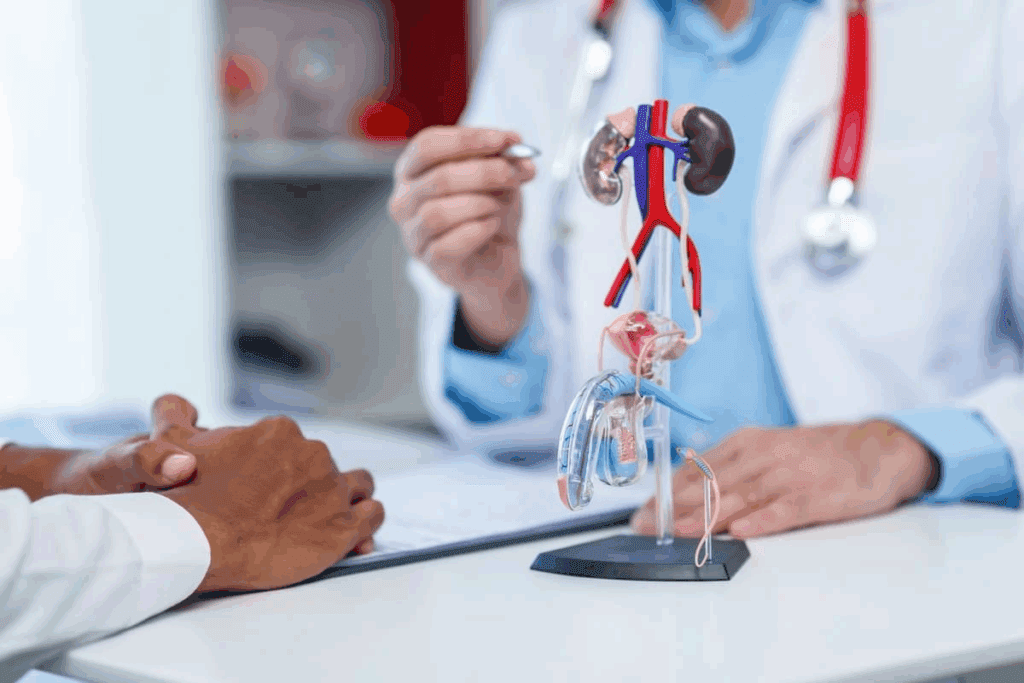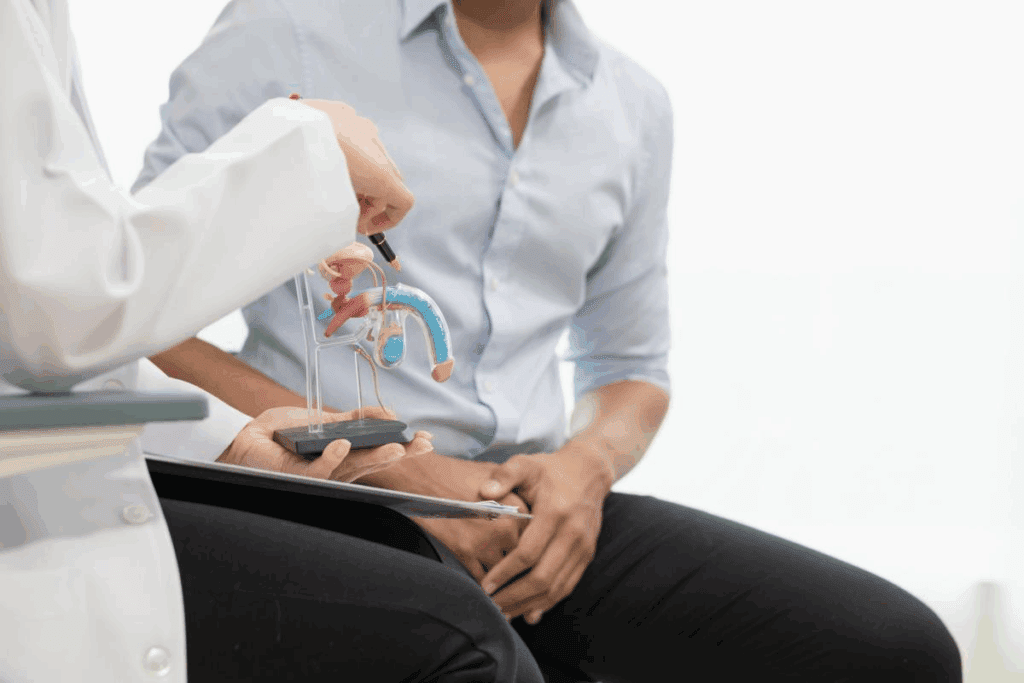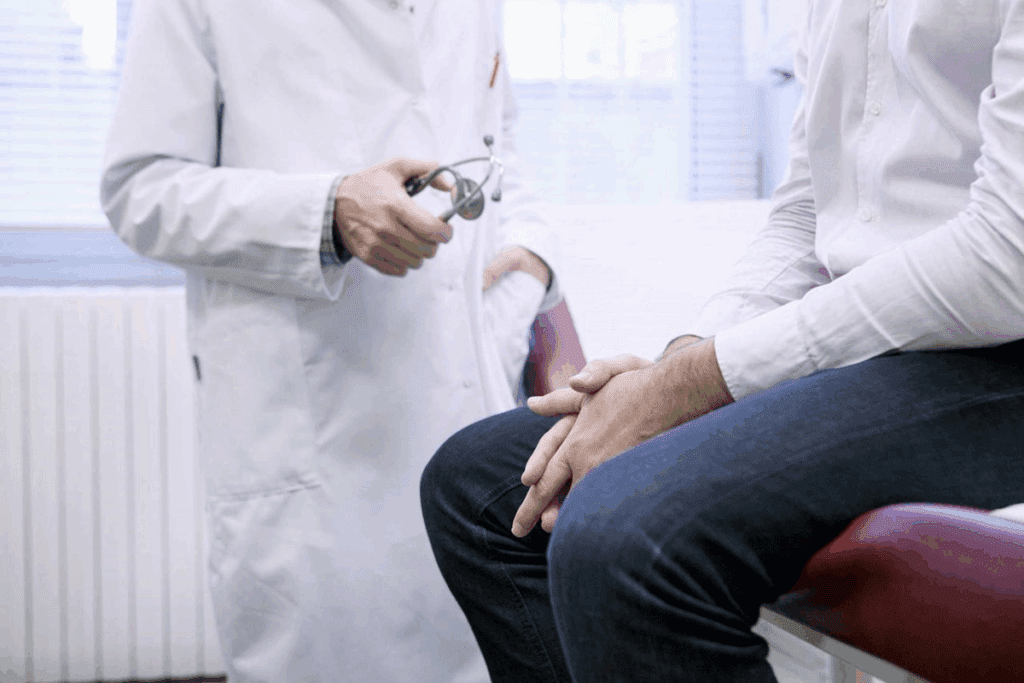
Discover how the bladder prostate relationship causes common urinary problems in men. Understand the link and find solutions.
The prostate gland is a small, walnut-sized gland in the male reproductive system. As men get older, the prostate can grow bigger. This can lead to urinary problems.
It’s important to know how the prostate affects urination. This knowledge helps men stay healthy. An enlarged prostate can make it hard to start urinating, lead to a weak flow, and cause frequent trips to the bathroom.
By understanding these issues, men can take steps to improve their urinary health. This proactive approach is key to maintaining good health.
The Prostate Gland: Anatomy and Function

Discover how the bladder prostate relationship causes common urinary problems in men. Understand the link and find solutions.
The prostate gland is key to male health, affecting both urine and reproductive systems. It sits below the bladder and wraps around the urethra. The urethra is the tube that carries urine out of the body.
Anatomy of the Prostate Gland
The prostate gland is made of glandular tissue and smooth muscle. It has different zones, each with its own features. Knowing the prostate’s anatomy helps doctors diagnose and treat problems.
Function of the Prostate Gland
The prostate gland’s main job is to make fluids that help sperm. This fluid is full of enzymes, proteins, and nutrients. These help sperm stay healthy and move well.
Impact on Urinary Health
An enlarged prostate can block the urethra, causing urine flow issues. This can lead to urinary problems. Keeping the prostate healthy is important for good urine flow.
The Bladder-Prostate Connection: How They Work Together

The Bladder-Prostate Connection
The prostate gland is around the urethra and is key to the urinary system. As men get older, the prostate can grow, causing many urinary problems.
Understanding the Prostate
The prostate gland is a critical part of the male reproductive system. When it gets bigger, it can lead to trouble with urinating and other symptoms.
Symptoms and Effects
Men with a big prostate might have trouble with weak urine flow, need to pee a lot, and pee at night. These issues can really affect their daily life.
By knowing how the prostate and urinary issues are connected, men can start to take charge of their health.
Common Urinary Problems in Men
Urinary problems can really affect a man’s life. Issues like needing to pee a lot, feeling urgent, and having a weak stream often tie back to the prostate. It’s key to understand these issues and their causes to get the right help.
Men facing these symptoms should know the possible reasons. They should talk to a doctor for a proper check-up and treatment.
Some common symptoms to watch out for include:
– Frequent urination, even at night
– Feeling like you really need to pee
– Having a weak or interrupted urine flow
– Pain or burning when you pee
If you’re dealing with any of these symptoms, getting medical help is a must. It’s important to find out the cause and stop any further problems.
Understanding Benign Prostatic Hyperplasia (BPH)
Benign Prostatic Hyperplasia (BPH) is a common issue for men as they get older. It makes the prostate gland grow bigger. This can cause many urinary problems.
Common symptoms include:
- Frequent urination
- Weak urine flow
- Incomplete bladder emptying
The exact reason for BPH isn’t known. But, it’s thought to be linked to hormonal changes that happen with age.
There are ways to manage BPH. These include watching it closely, taking medicine, or surgery. Making lifestyle changes, like eating right and staying active, can also help.
Knowing about BPH is key to keeping a good quality of life as men age.
Prostatitis and Its Impact on Urination
Prostatitis is a condition where the prostate gland gets inflamed. It affects how men urinate. Knowing its causes, types, and treatments is key.
Types of Prostatitis
There are different types of prostatitis. Each has its own features. Here are a few:
- Acute bacterial prostatitis: This is caused by a bacterial infection. Symptoms come on suddenly and are severe.
- Chronic bacterial prostatitis: This type is also caused by bacteria but is less severe. It lasts longer.
- Chronic prostatitis/chronic pelvic pain syndrome (CP/CPPS): This is the most common type. It involves chronic pain and urinary issues without a bacterial infection.
- Asymptomatic inflammatory prostatitis: This type is found during exams for other conditions. It doesn’t show symptoms.
Symptoms Specific to Prostatitis
Symptoms of prostatitis vary by type. Common ones include:
- Pain or discomfort in the pelvic area
- Urinary frequency and urgency
- Difficulty starting or stopping urination
- Painful urination
- Sexual dysfunction
Knowing these symptoms helps in diagnosing and treating prostatitis.
Treatment Approaches for Different Types
Treatment for prostatitis depends on the type and how severe it is. Options include:
- Antibiotics for bacterial prostatitis
- Alpha-blockers to relax the muscles around the prostate
- Anti-inflammatory medications to reduce pain and inflammation
- Lifestyle changes, such as dietary adjustments and stress management
It’s important to talk to a healthcare professional to find the right treatment for you.
Prostate Cancer and Urinary Symptoms
Prostate cancer can lead to urinary symptoms, similar to those seen in benign prostatic hyperplasia (BPH). It’s key to know the differences to offer the right care.
Differences Between Prostate Cancer and BPH
Both conditions can cause urinary issues, but they have different causes and effects. Prostate cancer grows cancer cells in the prostate gland. This can block urine flow and cause more serious symptoms.
Men with ongoing or severe urinary problems should see a doctor. They need a proper diagnosis and treatment plan.
Diagnosing Prostate-Related Urinary Problems
To find out if prostate issues are causing urinary problems, doctors use a few key steps. They start with a detailed medical history, a physical check-up, and lab tests.
Physical Examination
A physical exam is key in spotting prostate-related urinary issues. Doctors will do a digital rectal exam (DRE). This helps them see how big and what the prostate feels like.
Laboratory Tests
Lab tests like urinalysis and PSA tests help doctors figure out and keep an eye on prostate issues. These tests are important for diagnosing and monitoring.
Diagnostic Tests
Doctors might also use imaging studies and urodynamic tests. These tests help confirm the diagnosis or check for other possible problems.
Treatment Options for Prostate-Related Urinary Issues
Treatment for prostate-related urinary issues is varied. It includes medications, minimally invasive procedures, and lifestyle changes. The aim is to ease symptoms, enhance quality of life, and avoid complications.
Medications like alpha-blockers and 5-alpha-reductase inhibitors are often used. Alpha-blockers relax muscles in the prostate and bladder neck, making it easier to urinate. 5-alpha-reductase inhibitors help shrink the prostate over time.
Procedures like transurethral microwave therapy (TUMT) are also effective. TUMT uses microwave energy to shrink prostate tissue, improving urine flow.
Lifestyle changes can also help manage these issues. Eating right, drinking enough water, and exercising regularly can improve urinary health.
By creating a personalized treatment plan with a healthcare provider, men can manage their urinary issues. This approach improves their overall quality of life.
Conclusion: Managing Prostate Health for Better Urinary Function
It’s key to focus on prostate health for a better life. Knowing the risks and acting early can help avoid prostate problems. At Liv Hospital, we offer full care to support your prostate health.
With the right treatment, men can live a healthy and active life. We’re here to help you achieve that goal.
FAQ
Q: What is the role of the prostate gland in male urinary health?
The prostate gland is key in the male reproductive system. It surrounds the urethra and impacts urine flow. When it grows too big, it can block the urethra, causing urinary issues.
Q: What are the common urinary problems in men?
Men often face issues like needing to pee a lot, feeling urgent, having a weak stream, or not emptying fully. These can stem from BPH, prostatitis, or even cancer.
Q: How does Benign Prostatic Hyperplasia (BPH) affect urination?
BPH is when the prostate gets too big and presses on the urethra. This can make it hard to pee, leading to symptoms like needing to go often, feeling urgent, and having a weak stream.
Q: What are the treatment options for urinary problems related to an enlarged prostate?
For an enlarged prostate, treatments range from meds to surgery. Drugs can relax the prostate and bladder, helping urine flow. Procedures like microwave therapy can also work. Sometimes, surgery is needed to clear the blockage.
Q: How is prostate cancer diagnosed and treated?
Doctors use a physical exam, medical history, and tests like PSA and biopsy to find prostate cancer. Treatment depends on the cancer’s stage and may include surgery, radiation, or hormone therapy.
Q: What lifestyle changes can help manage urinary problems?
Healthy habits like a good weight, exercise, and avoiding bad foods can help with urinary issues. Also, good bladder habits, like going when you need to and not holding it, are important.
Q: When should I seek medical attention for urinary problems?
If you have ongoing or severe symptoms like trouble starting or stopping urine flow, painful peeing, or blood in urine, see a doctor. Early treatment can make a big difference and prevent complications.
References
World Health Organization. (2025). How Does the Prostate Affect Urination and What. Retrieved from https://www.who.int/news-room/fact-sheets/detail/prostate-health



































